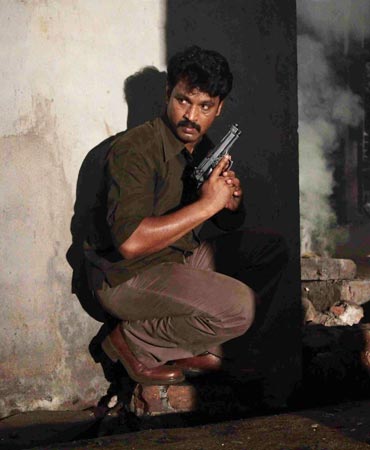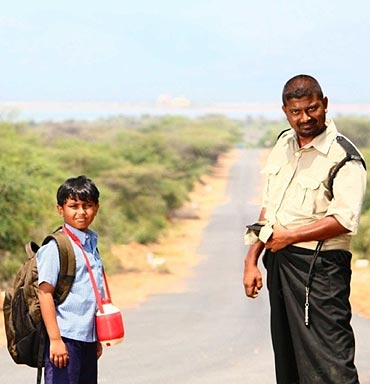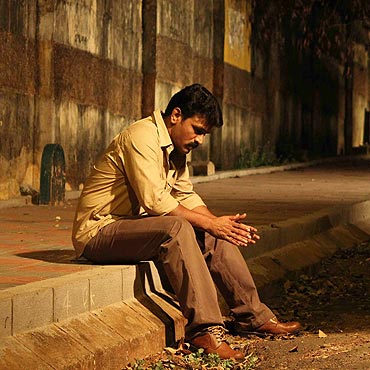
Mysskin is one film maker who can be called a rebel. His Tamil films are different, and so are his thoughts. His office is adorned with photographs of Kurasowa, Takeshi Kitano and also Satyajit Ray, the three filmmakers he admires.
After the hugely successful Chithiram Pesuthadi and Anajathe, he made a sensitive film like Nandhalala which was hailed as one of the best films made in 2010.
Soon after Nandhalala comes a murder mystery Yudham Sei (wage a war) with actor-director Cheran in the lead.
In this interview, Mysskin talks about life after Nandhalala and also Yudham Sei releasing on February 4. Excerpts:
Your last film Nandhalala was about the journey of a child and a mentally challenged young man in search of their mothers. Yudham Sei is a murder mystery. Was it a conscious decision on your part to make a film that is totally different from Nandhalala?
I would not describe it as a conscious decision. I want to make films in all genres and I do not like to stick to any particular one. The idea behind Yudham Sei stayed with me for a very long time. In fact, much before I made Nandhalala, I had this desire to make a murder mystery. So, I decided to make this after Nandhalala.
You told me last time that you wrote Anjathe in anger. How was the process of writing Yudham Sei?
It was easy. I took 20 days to write the script. Soon after that, we started shooting and within 90 days, the whole film was ready. I shot all my other films also in 81 days. The location I chose to shoot Yudham Sei was close to my office. So, everything went quite smoothly.

How do you manage to shoot in such a short time?
I insist on extensive rehearsals for 20 days. Because of the rehearsals, it is easy for the actors to perform while shooting the film.
These days actors like Kamal Haasan are talking about the need to have rehearsals...
I have been holding rehearsals from my very first movie. That was because I make films with new faces. So, it is very important to have rehearsals to make them prepare for the role. With rehearsals, I also get to know their capacity. They in turn also get an idea of what I expect from them. Actors and director should be able to communicate well while shooting and that is possible only if we understand and know each other well.
In Nandhalala, you were both an actor and the director. Did you have rehearsals?
Nandhalala is a very personal story. I didn't feel the need to have rehearsals though I consider myself an amateur artist. It was a story that I carried with me for several years. The director in me let the actor in me do what I felt like at that particular moment. What I did came from my heart and spontaneously. I made sure that I never went to the monitor and saw how I performed.

Was it tough directing yourself?
It was. I was very self conscious but somehow I managed it. But I was enjoying myself as an actor. When I announced that I was going to act, most of those I know discouraged me.
You told me last time that you had to do the role as no actor you approached agreed to do it...
Yes, that was the only reason why I had to essay the role. I didn't get any actor to portray the role. They felt there was nothing in it for them. I cannot blame them also.
Did you expect the kind of positive reaction to your film?
Not at all. It was beyond my expectations. Unbelievable. Not even in my wildest dreams, I expected such a reaction. I was bowled over. I made the film not for critical acclaim or commercial success.
Do you call Nandhalala personal cinema?
It is. In fact, it was born out of some memories of mine. I have a mentally challenged brother. There is a scene in the film where the father feeds the child while the mother sits in a corner and cries. It was a scene I saw when I was six. It was an image that never left me. The day I became a director, I wanted to heal that wound.
You have always made films with not so well known actors but you chose Cheran, a well known director-actor to essay the main role in Yudham Sei. Why?
The character is a 36-year-old CB-CID officer. There is no romantic interest for him in the film. He is assigned to investigate a murder. When I wanted an actor to portray the role, I found first that there are no actors in Tamil who could play such a role. Suddenly, Cheran's image came to my mind. I also wanted to work with a known face in this film.
Cheran is known to portray characters that are realistic; a common man. But the way I wanted him to portray the character was not like the way he had done so far in his films. I told him that. I went and observed him for many days and told him, 'I do not want you to do some of the things that you do.'
I wanted him to be very subtle and understated. You see police officers in Tamil cinema delivering punch dialogues, talking all the time and fighting twenty men but in Yudham Sei, you will not see anything of that sort. This will be a very simple, underplayed role.
What was Cheran's reaction when you asked him to play the main role?
He was actually very doubtful initially. He asked whether he could perform it well. I told him, he could. When he read the full script, he agreed to do the role. But I felt he was the right person to do the role.
Was it tough directing another director?
Not at all. Everybody discouraged me when I announced that Cheran was acting in my film. Many told me as he was both an actor and a director, he would interfere with the way I worked. I told him that he could ask me as many questions before the shoot started but once on the sets, he could not ask any questions. He stuck to it.
Yudham Sei means "wage war". With whom does the protagonist wage war?
He is an innocent man who is chased and made to run, run, run. One day when he cannot take it any more, he stops and looks back at the evil that is chasing him. That's when war starts,
Is it the story of good versus bad?
Yes.
You always start shooting with a bound script. How important is it to have a full script to make a good film?
It is like a warrior going to the battle with all his weapons. Script is a directors' weapon; without that, he is a failure.
Do you visualise while writing the script or after you finish writing?
Every film requires a different kind of visualisation. For Chithiram Pesuthadi, I had visualised the whole film but for Anjathe, I changed 50% of the visuals on the spot. For Nandhalala, though I had an idea and each and every shot was improvised on the spot. In Yudham Sei also I followed the same pattern. As this film is a thriller, I had to be there and be the character and change the way the story progressed. The film evolved on the location.
What is film making to you?
Making films is my life. I live only when I am making films. When I am not shooting, I am not living. I like to expect the unexpected. That is why the location plays a major role in my film.
Do you still carry the inner rage with which you wrote Anjathe?
No. After I made Nandhalala, I am calm and and peaceful. While shooting the film, there was a catharsis inside me. I made all the characters look inward and it also helped me look inward and that was how the catharsis happened. Now I am tranquil inside. I am more compassionate too. It is a beautiful feeling.